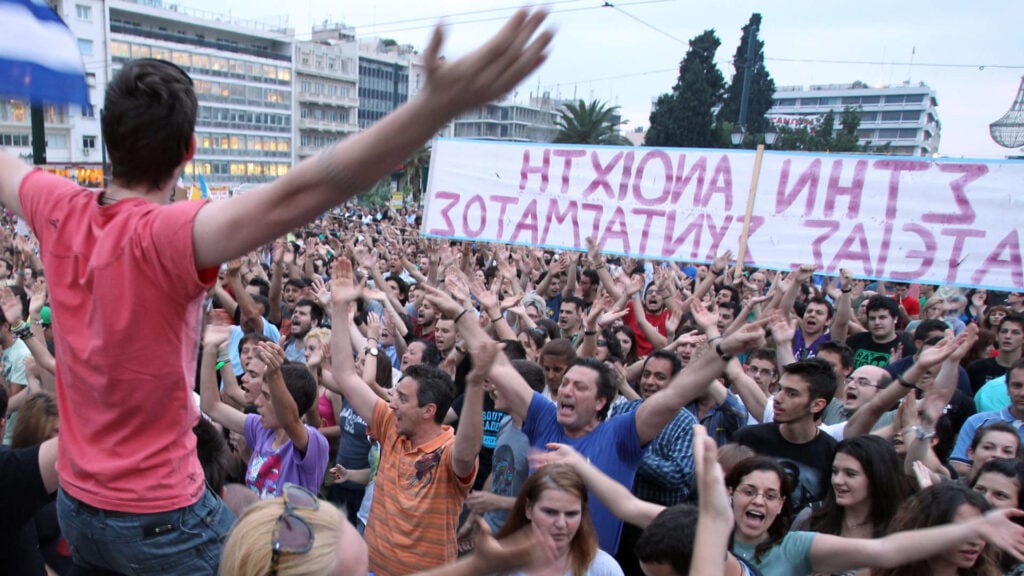Greece’s population is forecast to decline in the next three decades and demographic ageing will continue, while the balance of births versus deaths will remain negative, according to a new study.
In the analysis titled “Demographics and low fertility in Greece today: demographic inertia and social challenges”, authored by Associate Professor Iphigenia Kokkali, director of the Laboratory of Demographic and Social Analyses at the University of Thessaly, the collapse in births is highlighted. In 2023 there were 72,300 births, roughly half the annual average recorded in the period 1951–1970.
“The reasons behind this collapse are not found only within the field of demography, but relate more broadly to the social challenges Greece has faced in recent decades,” the report stresses.
Population fell by nearly 500,000 people
Between 2011 and 2024, Greece recorded a consistent natural decrease (deaths outnumbering births), combined with negative migration balances, resulting in a population decline of nearly 500,000 people.
The analysis notes that Greece today records one of the lowest annual fertility rates in the European Union. Generational fertility among women born around 1980 is between 1.3–1.4 children per woman, far below the replacement threshold of 2.07.
At the same time, Greece is a relatively old country: nearly 23% of its residents are over 65, and in 2023 those over 65 outnumbered children aged 0–14 by almost one million.
Childlessness is also increasing: among generations born around 1980, around one in five remain without children.
The beginning of the decline
According to the study the onset of the population decline began soon after a decade of migration, suggesting that it had already been in progress before the economic crisis that hit Greece in the early 2010’s.
“Greece’s population decline began in 2011, and not earlier, precisely because of the mass entry of foreigners between 1991 and 2010, which created a positive migration balance of 795,000 people,” Dr Kokkali said.
The arrival of mostly young people in search of work slowed population ageing, boosted fertility, and revitalised demographic dynamics, since population growth between 1991 and 2011 is almost entirely attributed to the increase in foreign residents.
The financial crisis reversed the trend, and migration balances again turned negative, as before 1990.
In the decade 2011–2021, outflows continued: both migrants who had settled in Greece in the previous two decades returning home, and young Greeks (25–34, but also 35–45) emigrating abroad.
The analysis also highlights other aspects of the demographic issue that are tied to low fertility but concern broader social challenges faced by Greece.
“Exodus” and housing
“In Greece’s already strained demographic structure, we could say schematically that today’s living conditions either push young people to emigrate, or to remain childless. These are fundamental issues if we are to address low fertility and the scale of population decline in the coming decades,” the study notes.
The study identifies three main causes of youth emigration:
- The search not just for work, but for jobs matching their education level, with career prospects, adequate pay, and good conditions.
Chronic problems such as lack of meritocracy. - Broader social factors, such as the desire for open, safe, dynamic, and tolerant societies, and exposure to different cultural environments.
- On top of this, the housing crisis has become a major factor.
“Research shows that cohabitation of young couples increases the likelihood of having a first child and accelerates family formation. In Greece, however, unlike other European countries, the age of leaving the parental home is rising, as are the average age of marriage and of having children.”
This delay, combined with other negative factors, affects not only family formation and childbearing age, but also the total number of children future generations will have.
Conclusions of the study
Low fertility is not just a demographic issue but above all a social one.
Young people will not be persuaded to have children “for the good of the homeland.”
What is needed is a comprehensive improvement of living conditions: work, wages, housing, and social services. Without these, Greece risks remaining a country that “either pushes young people to leave or into childlessness.”
Specifically, the report identifies two key demographic reasons for the fall in births:
- The number of children per woman has fallen (fertility is now below 1.4 children per woman).
The population of reproductive age (15–49) has declined and will continue to decline, further reduced by emigration of young people. - Beyond demographics, the analysis stresses that Greece’s living conditions – work, housing, health, education, family and child support – need major improvements.
For younger generations, the ongoing “brain drain” and the expectation of many more leaving underscore the seriousness of the situation.
This raises the uncomfortable question: is Greece today a “good place to live, form a family, and raise children”?
The study stresses that piecemeal financial incentives (such as birth bonuses) cannot convince young people to have children, especially in a context of insecure work and risk of unemployment.
It points out that Greece’s economic competitiveness is based on low wages and undeclared labour, which neither raise productivity nor strengthen social security funds.
The core reason for the brain drain remains the lack of jobs matching education, with prospects, fair pay, and good conditions — a fact confirmed by OECD and the European Centre for the Development of Vocational Training (CEDEFOP) data
Meanwhile, affordable housing is increasingly out of reach due to market pressures, leaving many young people unable to leave the parental home even when employed.
The study concludes:
- In today’s Greece, living conditions seem to push young people either towards emigration or childlessness.
- If the aim is to reduce low fertility and population decline, living conditions — including work, wages, and housing — must be improved. This applies both to young Greeks and to migrant and refugee populations living and working in Greece.
- Migration policy must also be reconsidered, the study notes, quoting IOBE director Nikos Vettas, who argues for a coherent migration framework that integrates migrants, attracts highly skilled workers, and creates conditions to stop the outflow of young Greeks and encourage their return.









